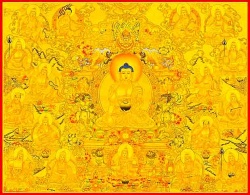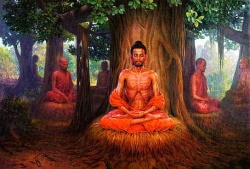The 8 Forms of Suffering
In Barfly, the 1987 film about the famously alcoholic writer Charles Bukowski, the following dialogue occurs about suffering:
Tully: You can really write. Why do you live like a bum?
Henry (who is basically Bukowski): I am a bum. What do you want me to do? Do you want me to write about the sufferings of the upper classes?
Tully: This may be news to you but they suffer too.
Henry: Hey baby, nobody suffers like the poor.
That last phrase has stuck with me for years. Throughout my time in the Peace Corps, in my work in international development and humanitarian relief, and as a Buddhist, I've often wondered if the poor suffer more. I used to think they definitely did, although I have seen some very well adjusted poor people and I have seen lots of miserable rich people. The poor obviously suffer more in the material sense. Those who live in constant fear of violence may suffer even more than those who are just poor.
For those of us that have the luxury of philosophising about suffering, we suffer mostly in our minds, although some day we will all be sick and eventually we will all die, and that causes suffering too. I have seen many poor people who seem much more in control of their attitudes than the rich. Maybe that is because they have so much more awareness about suffering, while the rich try to hide from suffering through materialism.
In the midst of our pondering, we might turn to Buddhism for some insight. As Buddhism has been referred to as the science of mind, it is no wonder that the focus here is more on mind than on social class.
According to Buddhist teaching, suffering comes in many forms; eight, to be precise. These 8 sufferings appear in various versions or translations, but Chogyam Trungpa talked about the 8 Sufferings like this:
birth,
old age,
sickness,
death,
getting what you don't want,
not getting what you want,
getting what you want while not being able to hold onto it forever,
and then there is the most mysterious one of all, which is all pervasive suffering or misery.
All pervasive suffering is not denying that there is happiness. Rather, it is neurotic energy that clouds the experience of basic goodness, emptiness, or simply put: the way things are. This all pervasive suffering is the sense of dread I used to feel when I was a kid on Sunday afternoons, owing to the anxiety about going to school on Monday. I couldn't just enjoy the weekend because my mind had already taken me to Monday. If you have ever had this experience, then you can appreciate why it would be helpful to train ourselves to be present.
Being happy has a lot to do with learning to be present and to appreciate the moment in front of us. Whether we are rich or poor, our untamed minds will wildly lead us to suffering if we don't learn to make the mind a friend and an ally.
</poem>

